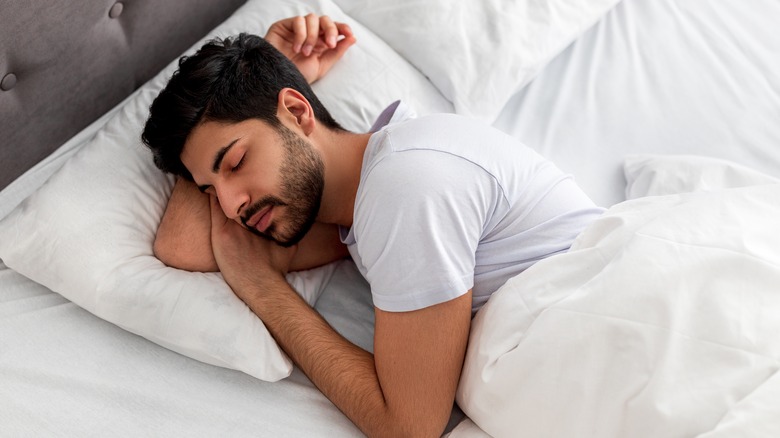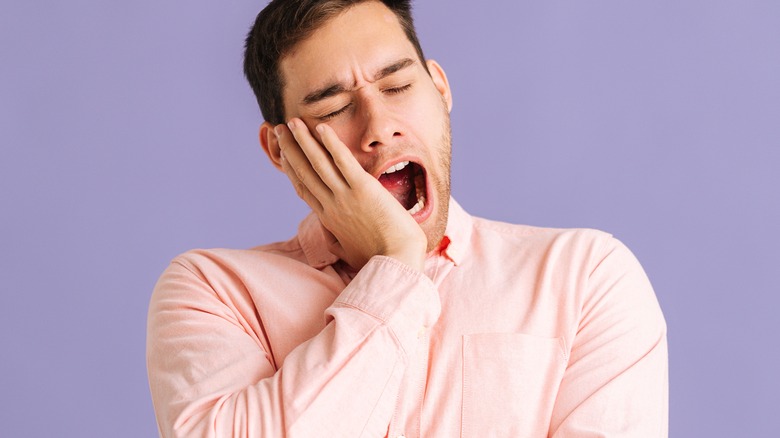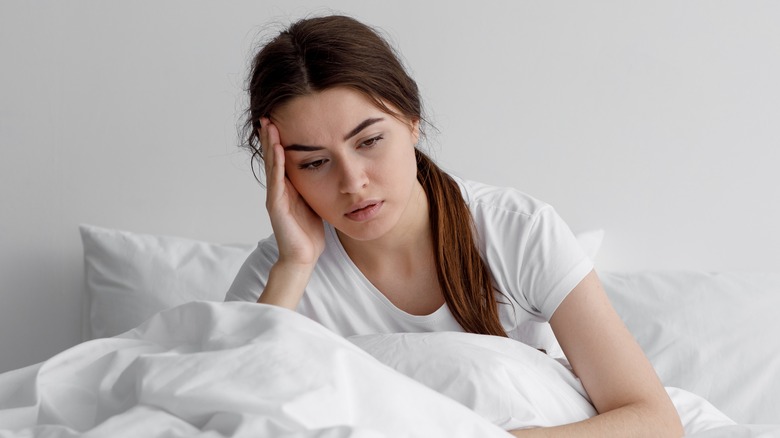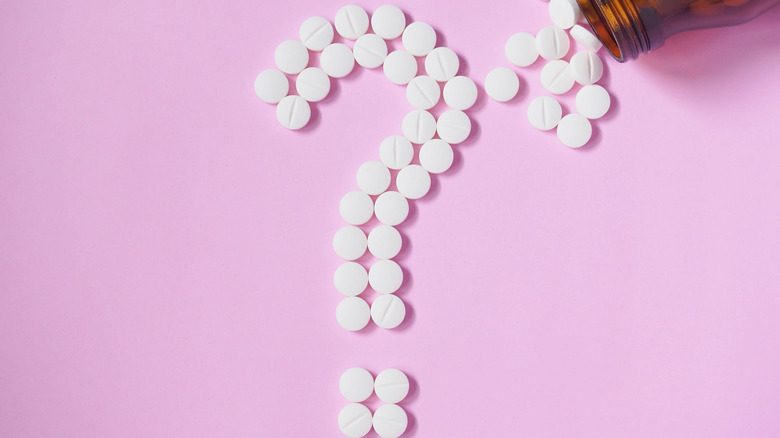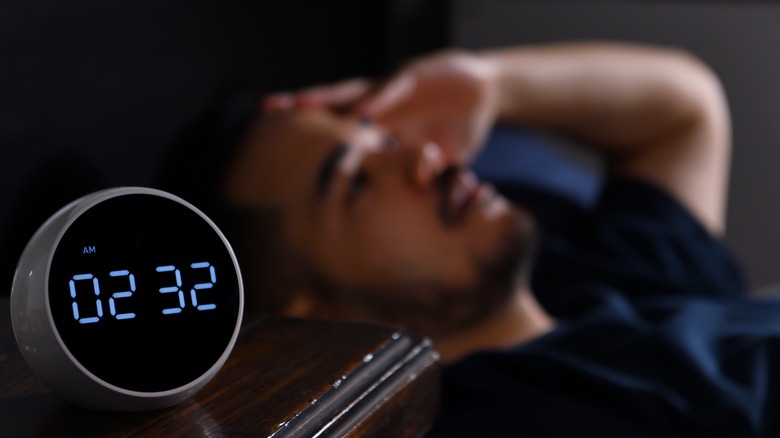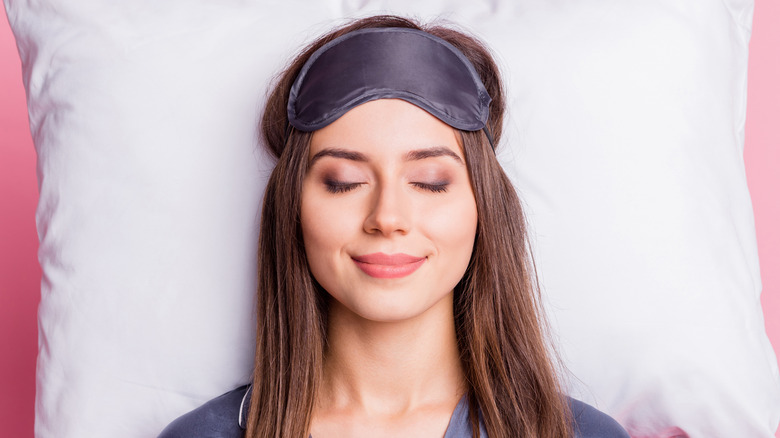Ambien Explained: Usage, Dosage, And Side Effects
Ambien is the brand name of zolpidem, a prescription medication used to treat sleep problems in adults. It comes in two forms: Ambien and Ambien CR. The former is an immediate-release formula used for short-term treatment of difficulty falling asleep, while the latter is a continuous-release medication used for the treatment of problems falling asleep and/or waking frequently during the night. Zolpidem also comes as a spray and as a sublingual tablet that dissolves under your tongue (via Healthline).
As Ambien is a powerful medication, it can only be taken with a doctor's prescription; your doctor will decide which type of Ambien is best for you. The drug comes with many warnings and potential side effects, and it has the potential for dependence and abuse (via an article in the British Journal of Clinical Pharmacology). It may also interact negatively with certain health conditions and prescription medications you may be taking (per Healthline).
It's important to never take Ambien without a doctor's approval and careful monitoring. Keep reading to learn everything you need to know about this popular drug.
How Ambien works
For some people, drifting off to sleep when they get into bed can be a bit of challenge. Even though they may feel tired, their minds just won't seem to shut off, and they end up laying in bed wide-eyed, staring at the ceiling instead of snoozing. For others, drifting off isn't a problem; unfortunately, they find themselves waking up during the night or waking up too early and not being able to get back to sleep. Still, others may have trouble both falling asleep and staying asleep. Everyone has occasional problems sleeping, but this chronic inability to fall and/or stay asleep is called insomnia (via Penn Medicine).
Medications like Ambien can aid people suffering from insomnia. It's because such drugs slow down brain activity, helping them fall asleep and stay asleep longer. Ambien works quickly — within 30 minutes — to initiate the sleep process. The extended release version (Ambien CR) has a second layer that dissolves more slowly. This helps you stay asleep longer.
Efficacy of Ambien
Numerous scientific studies have proven Ambien's efficacy. A 2008 study in the journal Sleep found that taking zolpidem extended release tablets three to seven nights a week for up to six months significantly reduced sleep latency (time to fall asleep) and improved concentration and morning fatigue the following day. Additionally, a 2012 study in the same journal showed that a nightly dose of 10 milligrams of zolpidem was effective for up to eight months at reducing sleep latency and improving sleep efficiency.
A 2021 meta-analysis in Sleep Medicine showed that zolpidem was both safe and effective for treating insomnia disorder in 1,068 patients over a period of one month. Meanwhile, in a 2001 study published in Human Psycopharmacology, researchers compared zolpidem to temazepam, a type of benzodiazepine medication commonly used to treat insomnia, and found that zolpidem was more efficacious at helping study participants stay asleep. However, compared to temazepam, zolpidem reduced performance on a digit symbol substitution test (DSST) which measures cognitive performance, including motor speed, attention, and visuoperceptual functioning (via a review in the Journal of Clinic Psychopharmacology).
Common Ambien side effects
Insomnia can cause many unwanted effects, including daytime sleepiness, irritability, depression, and cognitive impairment (via the Mayo Clinic). However, while Ambien is effective for the short-term treatment of insomnia, it has its own set of side effects, ranging from mild to serious.
According to Drugs.com, the most common side effects of Ambien usage include daytime drowsiness, dizziness, weakness, light-headedness, or a feeling of being drugged; fatigue and loss of coordination; stuffy nose, dry mouth, irritation of nose or throat; nausea, constipation, diarrhea, upset stomach; headache and muscle pain. According to the Food and Drug Administration (FDA), the most commonly reported side effects among people who took a 12.5-milligram dose of Ambien CR were headache, somnolence (drowsiness), and dizziness. Nausea, myalgia, neck pain, hallucinations, disorientation, memory problems, visual disturbances, and fatigue were other commonly reported side effects.
It's worth noting that side effects can vary considerably by individual. Furthermore, women and the elderly are more likely to experience adverse drug reactions than men (via Public Citizen and American Family Physician).
Serious Ambien side effects
In some cases, Ambien can have very serious, even life-threatening, effects. Allergic reactions can be mild to severe, including anaphylaxis and angioedeme (swelling beneath the skin). According to the Mayo Clinic, you should call your doctor if you have any of the following symptoms: itching, rash, hives, trouble swallowing, swelling of the hands, face, mouth, or throat.
Some common side effects may not be hazardous on their own, but in certain populations or when combined with certain activities can be very dangerous. For example, elderly people who take Ambien are more prone to decreased alertness, drowsiness, dizziness, clumsiness, and unsteadiness, which can lead to falls and fractures. According to a 2017 study in Sleep Medicine, women and people over 80 years of age who take Ambien have an increased risk of motor vehicle accidents.
Other less common but serious effects of Ambien include chest pain; confusion; discouragement; unusual sense of well-being; fast, irregular or pounding heart rate; feelings of sadness or emptiness; generally feeling uncomfortable or ill; irritability; loss of appetite; loss of interest or pleasure in things you normally enjoy; shakiness and unsteady gait; difficulty concentrating; difficulty sleeping; trembling or other problems with coordination or muscle control; and unusual fatigue or weakness (via Mayo Clinic). Rare side effects requiring immediate medical attention include allergic reactions, crying, sweating, chest tightness, prickling sensations, bladder pain, paranoia, feeling of unreality, lack of emotion, speech problems, rapid mood changes, restlessness, visual or auditory hallucinations, severe fatigue, thoughts of self-harm, difficulty walking, and yellow eyes or skin.
Risk of strange sleep behaviors
One of Ambien's most unusual side effects is the risk of altered sleep behaviors. According to MedlinePlus, people taking Ambien have reported doing strange things while asleep, including making and eating food, sleepwalking, driving, having sex, and making phone calls, and having no memory of engaging in these activities upon waking.
An article in The American Journal of Medicine in 2008 reported a case of a man who, after taking a typical dose of 10 milligrams at bedtime, went outside and started his truck, backed into a tree, drove back into the driveway, went back in his house, and went back to sleep. The next morning, he had no memory of the episode.
The FDA reports that although these behaviors are rare, they have resulted in serious injury and death. Dangerous sleep behaviors can occur the first time you take the medication or even if you have been taking it for a long time, and they can occur at any dose, even the lowest recommended dosage.
Potential medication interactions
The danger with any medication is that it can interact negatively with other medications you may be taking. Therefore, it is important that you tell your doctor of any medications you are taking that they might not be aware of.
According to GoodRx Health, some categories of medications that may interact with Ambien include: opioids used to treat pain, such as morphine, oxycodone, and hydrocodone/acetaminophen; benzodiazepines used to treat panic disorders and anxiety, as well as sleep disorders; certain antidepressants, including tricyclic antidepressants (TCAs), such as amitriptyline, and selective serotonin reuptake inhibitors (SSRIs) like Prozac and Zoloft; and some medications that affect liver function, such as clarithromycin and ketoconazole. These medications interact with Ambien in various ways. In some cases, they may increase blood levels of Ambien. In others, they may lower blood levels, making the medication not as effective. If two medications share similar side effects (such as drowsiness or dizziness), those side effects can be amplified when both are taken together.
Ambien can also interact with some over-the-counter supplements, including melatonin, valerian, and St. John's wort (via Healthline). These natural substances can cause drowsiness that can compound the sedative effects of Ambien.
How to use Ambien
Ambien is typically taken right before bed (via the Mayo Clinic). You should only take Ambien when you are sure you have at least seven to eight hours to sleep. If you have to wake up before this time, you risk feeling very drowsy, and you may experience memory problems because the effects of the medication haven't had time to wear off yet.
Unless directed by your doctor, take the tablet or capsule whole and uncrushed. Time-release pills are specially designed to release medication over time. Cutting them can cause them to release all the medication at once, which can be dangerous (via the Cleveland Clinic). Additionally, Ambien should be taken on an empty stomach, because taking it with food may reduce its effectiveness (via the Mayo Clinic). This medication should not be taken with or within several hours of consuming alcohol.
Ambien dosage will vary from person to person, and it's very important that you take only the amount specifically prescribed to you — no more and no less. For extended release tablets, common dosages include 6.25 milligrams for women and older adults and 6.25 or 12.5 milligrams for men. On the other hand, for non-extended release tablets, the typical dose is 5 milligrams for women and older adults, and 5 to 10 milligrams for men. You should not take more than 10 milligrams per day. If you miss a dose, skip it and resume your normal schedule the next day — do not "double up" on doses.
FDA warnings for Ambien
Black box warnings, also called boxed warnings, are required on the packaging of prescription medications that pose potentially significant hazards (via the Cleveland Clinic). The warnings will appear in "bold font surrounded by a black border" on a slip of paper packed with the medication; they can also be found on the drug manufacturer's website.
Note that just because a medication has a black box warning, doesn't mean you shouldn't take it. However, it does mean that you need to practice caution, taking it only as directed by your doctor. The FDA issued the black box warning requirement in 2019 for several sleep medications, including Ambien, after "reports of injuries and deaths resulting from various complex sleep behaviors" that happened after the involved parties ingested the medications.
Although rare — as of 2019, the FDA had identified 20 deaths and 46 injury cases in 25 years — sleep medications still pose a great enough risk that both consumers and healthcare providers should be vigilant when taking and prescribing Ambien.
Ambien and alcohol
Like other sedative drugs, Ambien's label warns about the danger of combining it with alcohol. Ambien acts as a central nervous system (CNS) depressant (via the Mayo Clinic), and so does alcohol (per Addiction Center). This means they both lower the heart rate and blood pressure, relax the mind and cause drowsiness. Combining one CNS depressant with another is a recipe for disaster. According to the Hazelden Betty Ford Foundation, the substances are "potentiating" when taken together, which means that the depressant effects are increased exponentially, rather than linearly, and the withdrawal effects are also multiplied. It describes the combination as "a mixture than can lead to overdose and death," and stresses the danger of taking both substances simultaneously, regardless of the amount.
Some effects of mixing Ambien and alcohol may include: delirium, dizziness, drowsiness, marked effects on concentration, falling down, slowed speech, overdose, and enhanced withdrawal. If you take Ambien for sleep, you must not take it while there is still alcohol in your system. How long alcohol stays in your system depends on the type of drink and your own physiology. On average, one shot of liquor is metabolized in one hour, a pint of beer is metabolized in two hours, and a glass of wine in three.
Ambien dependence and abuse
One of the problems posed by sleep aids is that they can cause you to develop a dependence. Over time, you may need more of the drug to get the same benefits, and if you stop taking it, you may find yourself sleepless again, which can make it challenging get off the meds (via Harvard Health).
Some sleep aids are more likely to cause dependence than others. According to the Mayo Clinic, Ambien is not likely to cause dependency like some other sleep medications, including benzodiapenes. However, it is important to make a plan with your doctor to stop taking Ambien within a certain timeframe, and in such a way that reduces the risk of your body becoming dependent on it. Although it may not have a high risk of being habit-forming, the Mayo Clinic does note that Ambien is among the prescription drugs most likely to be abused. Prescription drug abuse means using a medication in ways other than how it was prescribed — like taking more and/or taking it more often than needed, for example. This can become compulsive over a continuous stretch of time, and have negative consequences.
Signs and symptoms of Ambien abuse can include: drowsiness, confusion, unsteady walking, slurred speech, poor concentration, memory problems, and slow respiration. In order to prevent dependence and abuse, it's important to take the smallest dose necessary for the shortest amount of time (via HelpGuide).
How to stop taking Ambien
One of the reasons people become dependent on sleep aids is because they stop taking them abruptly. This causes a withdrawal reaction that can manifest different side effects, one of which can be the inability to sleep (via Harvard Health). This is what causes many people to continue taking sleep aids for longer than they should. Other potential symptoms that can occur if you stop taking Ambien abruptly include: fatigue, panic attack, deliriousness, hand tremor, nausea, vomiting, hallucinations, nervousness, seizures, flushing, stomach cramps, rapid breathing and heart rate, uncontrolled crying, and lightheadedness (via American Addiction Centers).
Never stop taking Ambien without your doctor's approval. They will determine a schedule to wean you off the medication so as to avoid withdrawal symptoms. This schedule will depend on your dose and the length of time you've been taking Ambien. The half-life of Ambien — or the time it takes for the drug's active substance to decrease by half in your body — is 2.5 to 3 hours (via Mind and American Addiction Centers). Withdrawal symptoms can appear within as little as 6 to 8 hours after the last dose, but withdrawal symptoms typically peak at one to five days and disappear within one to two weeks.
Lastly, some factors may intensify withdrawal symptoms, including a long period of use, high dosages, increased age, and the presence of coexisting medical or psychiatric conditions.
Alternatives to Ambien
If you can't take Ambien due to side effects or it doesn't work for you (or isn't working for you anymore), there are other pharmaceutical alternatives. These include sedative-hypnotics Lunesta (eszopiclone) and Sonata (zaleplon), which are very similar to Ambien; benzodiapenes Restoril (temazepam) or Xanax (alprazolam); hypnotic medication Silenor (doxepin); melatonin receptor agonist Rozerem (ramelteon); and some antidepressants (via The Recovery Village).
Over-the-counter medications such as antihistamines and doxylamine may also work, but can still have similar side effects to prescription medicines (via the Mayo Clinic). Other over-the-counter remedies, such as melatonin, may also be just as effective as Ambien, according to a 2021 study in the Journal of Pharmacy Practice. Melatonin is a hormone the body makes naturally in repsonse to low light that signals the brain when it is time to go to sleep. Other natural remedies include valerian, St John's wort, chamomile, lavender, and passionflower (via Healthline and ScienceDirect).
Another option might be non-medicinal. Sleeping medications aren't a cure for insomnia, and some experts think that the sleep you get on sleeping pills isn't true, restorative sleep (via The Atlantic). The reasons you can't sleep are numerous, from stress, to physical pain, to the fact that you can't kick your 5 p.m. coffee habit (via the Mayo Clinic). The solutions are just as vast, from seeking out therapy to treating underlying health conditions. Finally, simple practices like creating a bedtime routine, practicing good sleep hygiene, and doing breathing exercises before bed can also help, and they don't come with FDA warnings (via Healthline).


